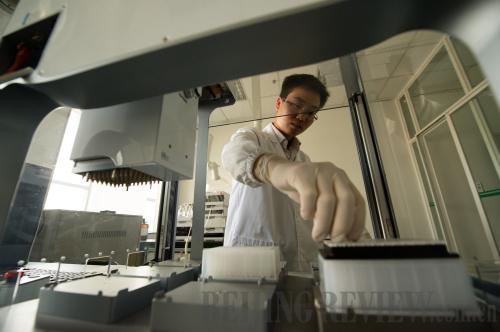|
 |
|
HI-TECH OFFICE: A technician works at the innovation platform of the Xuzhuang Software Park in Nanjing, capital of east China's Jiangsu Province (LI XIANG) |
It's a study in contrast. While other countries have uniformly shown concern over China's sluggish economy in the past two years, policymakers in the world's largest developing country have seemed optimistic, even going so far as to term the reduced growth rate "the new normal" for economic trends.
During his recent stay in Henan Province, Chinese President Xi Jinping urged governments at all levels to adapt this "new normal" as the standard for economic growth and to remain cool-minded amid a slowdown in the world's second largest economy.
In spite of economic deceleration, the Chinese Government has not resorted to stimulus packages in the past year, implying that the "new normal" has already permeated the mindset of policymakers.
Five signs
For Wang Jun, a senior economist from the China Center for International Economic Exchanges (CCIEE), the "new normal" reflects the fact that China's economy is shifting from high gear to middle gear.
According to statistics from the National Bureau of Statistics, in 2014, China's economy maintained its downward growth trend by registering GDP growth of 7.4 percent in the first quarter, far lower than the average annual growth of 9.3 percent from 2008 to 2012.
Wang predicted that the "new normal" will become more and more evident in five distinct ways. To begin with, medium growth will become the expected normal. In the future, Wang said China will experience a gearshift with GDP growth floating between 7 to 8 percent, a commonplace occurrence for middle-income countries.
Meanwhile, according to Wang, ongoing economic structural upgrading and adjustment will continue to forge ahead. Consumption and private investment contribute more to social demand and thus they have gradually become a major driver for economic growth. The service industry, and producer services in particular, has also gained momentum amid industrial upgrading. The regional gap is narrowing, and a pattern of coordinated development is taking shape. Resident income is increasing at a faster pace than corporate profit and fiscal revenue.
The next phenomenon was that innovation is replacing factors of production and investment as the main engine of economic expansion, said Wang. In the face of challenges arising from the adjustment of the world economy and opportunities emerging from the new round of its technological and industrial revolution, China is trying to focus on the elevation of quality and efficiency, and will allow technological progress and innovation to fuel its economy.
Wang warned that uncertainties will also become increasingly conspicuous on a number of fronts. The traditional manufacturing industry has been plagued by overcapacity, the rapid expansion of local government financing platforms and shadow banking have led to the escalation of credit default risks, a liquidity mismatch is making corporate financing more difficult and expensive, and a long-term mechanism for real estate control badly needs to be put in place. Moreover, it is likely that China's economic growth will continue being subject to the "slings and arrows" of external factors, such as changes of the international economic environment and policies, the ups and downs of the international capital market, the resumption of international trade protectionism, and foreign investment barriers.
| 